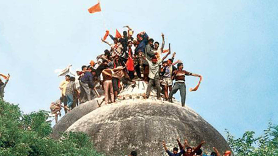

Hindus who oppose India’s turn toward religious zealotry must speak out, lest secular India becomes a Hindu Pakistan.
On December 4th, 1992, my dad was traveling on a train from Andhra Pradesh to Varanasi to deposit his father’s ashes. The train was unusually crowded. Hundreds of people dressed in saffron robes packed the train, talking eagerly about their trip to Ayodhya for a large rally and prayers. But it was clear to my dad and his family that these travelers were not innocent pilgrims. They loudly railed against the presence of the Babri Masjid Mosque in Ayodhya, complaining about how a Ram temple was destroyed in order to build the mosque and how Muslims were continuing to occupy the city. My dad’s uncle listened impatiently before interrupting their prattle.
“You aren’t really devotional, you are just trying to make mischief! You are going there to hurt people!” he said.
They denied it. But on December 6th, 1992, the Babri Masjid was destroyed.
The Babri Masjid mosque demolition was a pre-meditated attack by Hindu extremists and resulted in communal violence that killed around 2,000 people, mostly Muslims. Some Hindus believe the holy deity Ram was born at the same spot, and Mughal invaders built a mosque over a temple that once existed there. There is little to no evidence of this. But Hindu nationalists have used this claim to justify taking over the land to build a Ram Temple. The groundbreaking ceremony for this temple took place on August 5th, a sharp insult to Muslims who had their place of worship destroyed 30 years ago.
When Narendra Modi was first elected as prime minister of India in 2014, I was initially glad to see the Congress Party finally come to the end of its long, dynastic reign, a period endlessly embroiled with corruption scandals. But as the Bharatiya Janata Party (BJP) furthered its stronghold over India, it became obvious that the BJP was truly working to make India a Hindu nation that treated Muslims, Dalits, and other marginalized communities as second-class citizens. Over the past six years, communal violence against Muslims has significantly increased. On August 5th, 2019, India revoked Article 370 of the Indian Constitution, demoting Kashmir from a state to a territory, putting the Muslim majority region under a strict occupation by the Indian military.
In December 2019, India adopted the Citizenship Amendment Act (CAA), a law that threatens to deprive millions of Muslim Indians of citizenship. By creating a fast track to citizenship for non-Muslim migrants from Afghanistan, Bangladesh, and Pakistan, while Muslim Indians who are unable to provide proof of citizenship for the new National Population Register (NPR) risk deportation, statelessness, and/or long-term detention. The move was largely seen as a step toward the BJP’s goal of making India a Hindu nation. The latest move to build a temple over the site of a mosque destroyed by a mob of Hindu terrorists is the next step to moving away from the secular dream of India’s founders and establishing that India is a Hindu supremacist state where Muslims do not belong.
Like many Hindus, I am devastated by the rise of Hindu nationalism. I work with an organization called Hindus for Human Rights, which joined other advocacy groups in organizing to stop a display of brazen propaganda in Times Square celebrating the temple groundbreaking. For us, the festivities of August 5th was cruel grandstanding in the name of Hinduism. But the faith of the Bharatiya Janata Party and other Hindu nationalist groups is not my faith.
My Rama is not the same as their Rama. I grew up hearing stories about the Rama who believed every person in his kingdom needed to be treated equally. My Hinduism is not the same as their Hinduism. My parents taught me that there are many paths of worship, all ending in the same God. They taught me that there was never an excuse for hate or violence toward another person, whether in thoughts, words, or actions. Most importantly, they taught me that the core belief of Hinduism was that every living soul was divine, and we should love and serve others as manifestations of God regardless of who they are or what they believe in.
In July, Islamic clerics in Pakistan halted the construction of a Hindu temple in the nation’s capital, dashing hopes for a more religiously tolerant Pakistan. This month, Hindu nationalists in India started the process of building a temple over a site of violence and destruction for Muslims. Hindus who oppose India’s turn toward religious zealotry must speak out, lest secular India becomes a Hindu Pakistan.
